[Article updated December 2021]
When you’re starting a kitchen renovation there are so many options to consider and decisions to make. Choosing a kitchen benchtop—the functionality, colour and material—can seem a little overwhelming.
In this article we give you some kitchen benchtop ideas to get you started. We share the most common types of kitchen benchtops, the relative expense of each material and other factors you might want to consider before choosing a kitchen benchtop for your new kitchen.

Kitchen Benchtop Ideas: How to choose a kitchen benchtop
Your kitchen benchtops are a functional part of your life. But they also play a huge role in determining the finished aesthetic of your kitchen.
The type of kitchen benchtop you ultimately choose depends on what your priorities are. Price, colour, durability and uniqueness all factor into making a decision on which type of kitchen bench top you should select.
And taking the time to really think through which kitchen benchtop is best for your kitchen renovation can take time. But if you get it right the results will be so worthwhile.
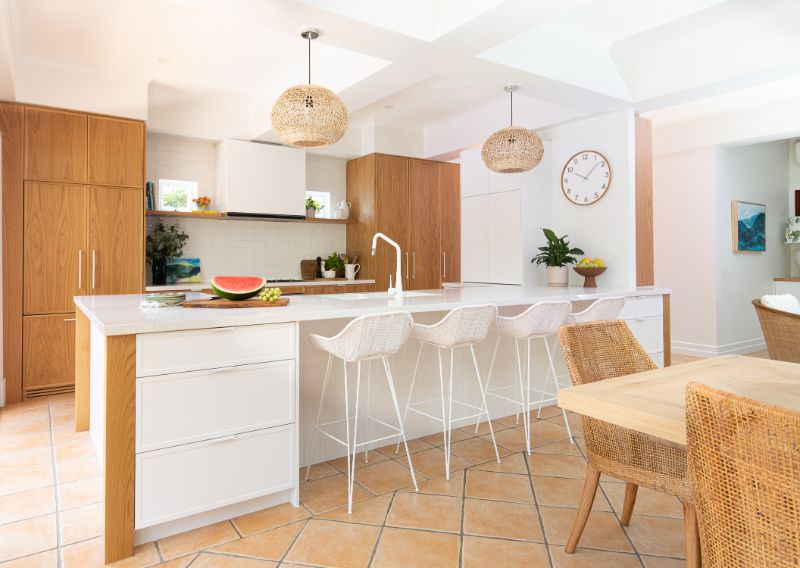
What is the best material for kitchen benchtops?
The first thing you need to consider is the best material (for you) for your kitchen benchtop. To help you understand your choices, we’ve pulled together eleven kitchen benchtop ideas and options for you. And we’ve laid out the pros and cons to help you to choose the best benchtop for your kitchen renovation.

1. Marble
Marble is a natural stone with a beautiful and unique finish. It is timeless and elegant and is considered a luxury benchtop option. When it comes to choosing, there are many different types of marble varying in colour and pattern.
Carrara marble is probably the most common marble used on kitchen benchtops in Australia. It is generally less expensive than other types of marble and is a firm favourite in Hamptons style kitchens and bathrooms.
When you decide to go with a marble kitchen bench top, you will have the opportunity to visit a supplier and personally select your slab to suit your individual taste. The finish you choose will depend on the style of your kitchen. Polished, honed and leathered are the most common finishes each with a different appearance.
Marble has a long history of use in residential interiors and has a reputation for being difficult to maintain. Yes, it can be delicate. But if it’s sealed correctly and used as recommended it delivers incomparable beauty.

2. Quartz / Engineered Stone
Quartz or engineered stone is a manmade product that contains approximately 93% crushed quartz crystals combined with resin to bind it all together. Pigment is added to create the large range of colours available. Engineered stone is popular and practical due to its large colour range, consistency in colour and pattern and reasonable price point.
It is often referred to as Caesarstone. However, there is a range of other brands on the market in Australia including Quantum Quartz, Silestone, Smartstone and Essastone.
Engineered stone is available in a variety of finishes including polished, matte, honed, concrete and rough. It’s resistant to scratches, cracks and spills. However care still needs to be taken to maintain an engineered stone kitchen bench. And it’s not recommended for uncovered outdoor applications as it will fade.
Engineered stone comes in a standard 20mm thickness with 30mm offered in some colours and 12 or 13mm available by some brands for vertical applications. Slabs vary in size from standard to jumbo. Availability may affect your selection if you have a larger kitchen island or bench.

3. Polished Concrete
If you’re after an industrial-style kitchen, then you’ll no doubt be considering concrete for your kitchen benchtop. Polished concrete can vary in colour depending on the mix of cement, aggregate and sand. If left unfinished it is porous. To avoid staining the benchtop should be finished and can be re-polished if damage occurs to the surface.
Like both natural and engineered stone polished concrete chips easily. Care needs to be taken not to drop items onto it.
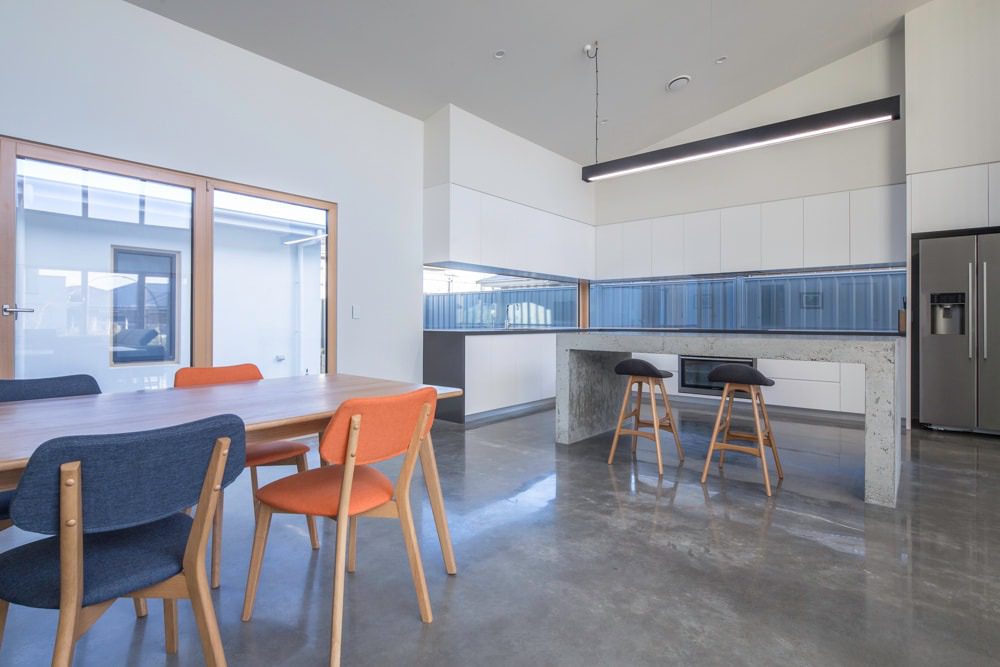
4. Solid Surface
Commonly referred to as Corian, solid surface is manufactured from a natural mineral refined from bauxite and blended with pure acrylic resin. Its unique composition gives it strength and fire-retardant properties.
Solid surface is able to be moulded and provides a seamless surface making it a great choice for large surfaces like a kitchen benchtop. It is extremely hygienic as there are no joins and very easy to keep clean. And it can also be used on the fronts of cabinetry for a seamless finish and because it’s translucent it can be backlit for a stunning effect.
While solid surface does scratch if objects are dragged across it, it is easily repairable by the manufacturer. In fact, entire pieces can be cut out and replaced if required.
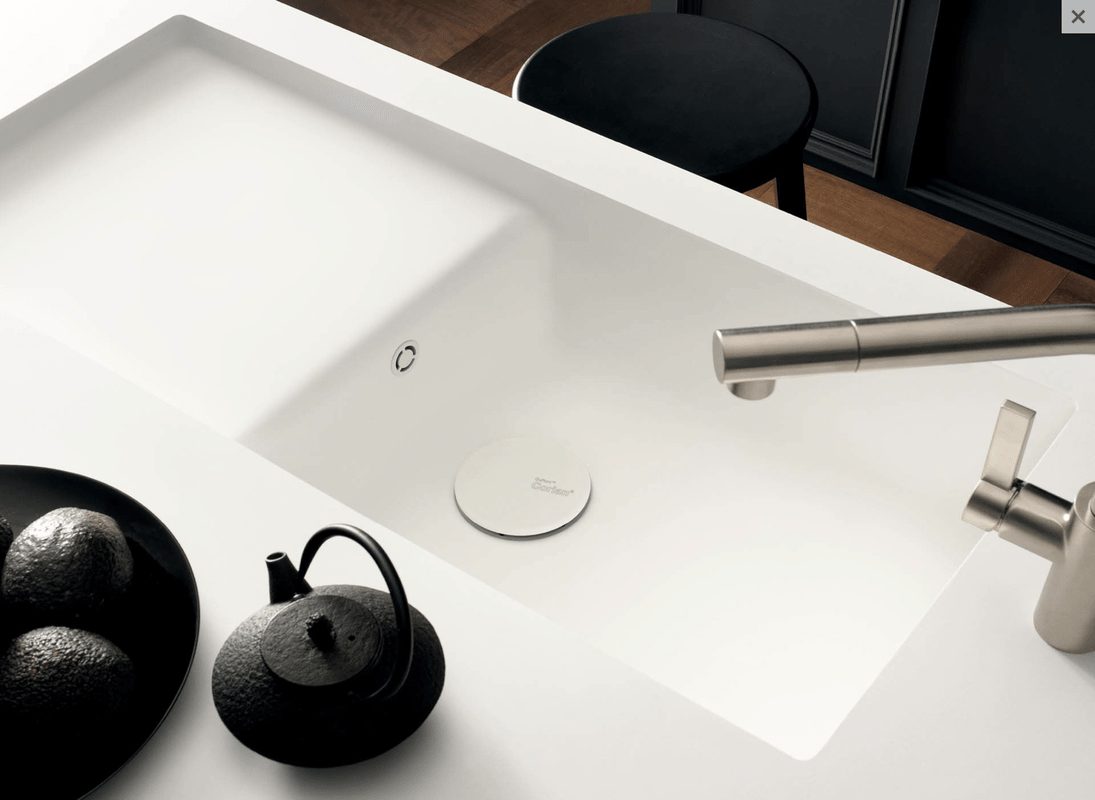
5. Laminate
The most popular budget option, laminate has been an in-demand kitchen benchtop material for years. Huge advances in laminate now mean it is available in colours and finishes to suit just about any kitchen style.
Laminate is a great choice if you want the designer look for your kitchen benchtop but don’t have the budget. It can be used to create almost any look and can be used to produce a waterfall edge and seamless joins for larger surfaces.
Laminate is a manmade product made of layers of paper over a chipboard, ply or MDF board. It is known to be extremely durable to scratching and can tolerate heat briefly. It can swell if water does get into areas where the surface is damaged. Laminex, Polytec and Nikpol are all brands of laminate.
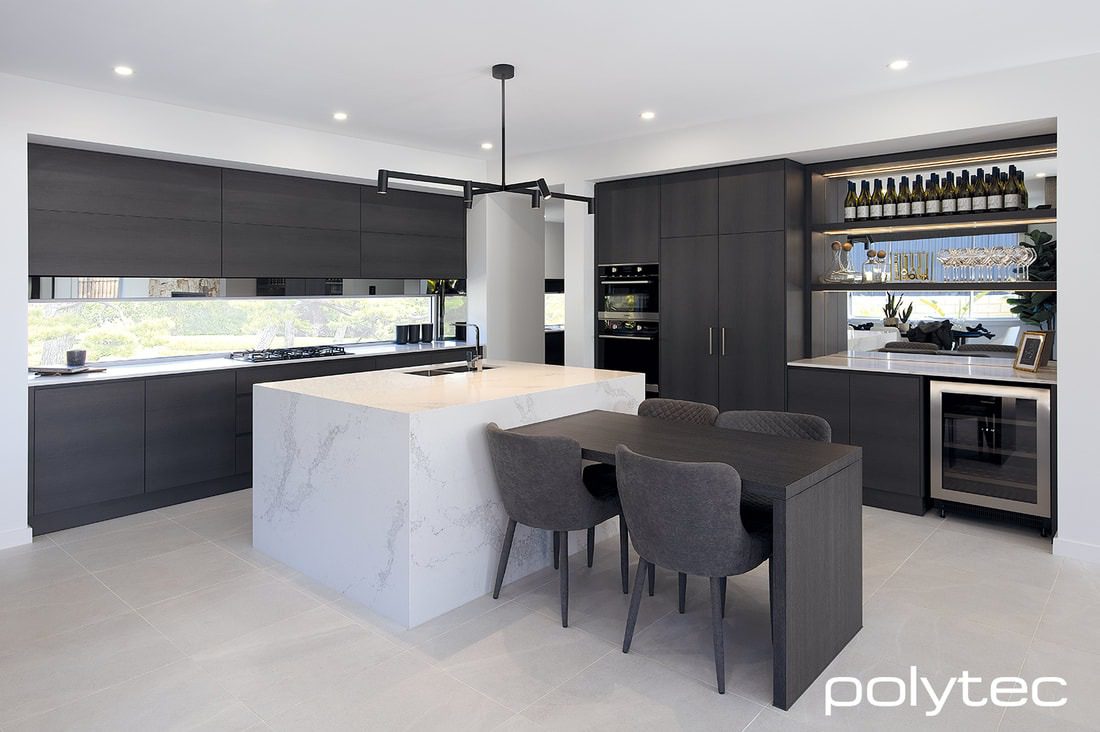
6. Timber
Timber kitchen benchtops are becoming increasingly popular for their organic nature and rustic appearance.
Timber has the ability to be repaired and is a soft surface to place items onto. It does need to be finished with oil or polyurethane to protect the surface. Oiled kitchen benchtops require you to regularly re-apply the oil to prevent drying out and cracking. Spills should be wiped straight away with a damp cloth for an oiled surface and warm soapy water or spray and wipe type products for polyurethane surfaces.
Care needs to be taken not to place hot pans or trays onto a timber bench. However, timber can be sanded back and refinished if damage occurs to the surface.
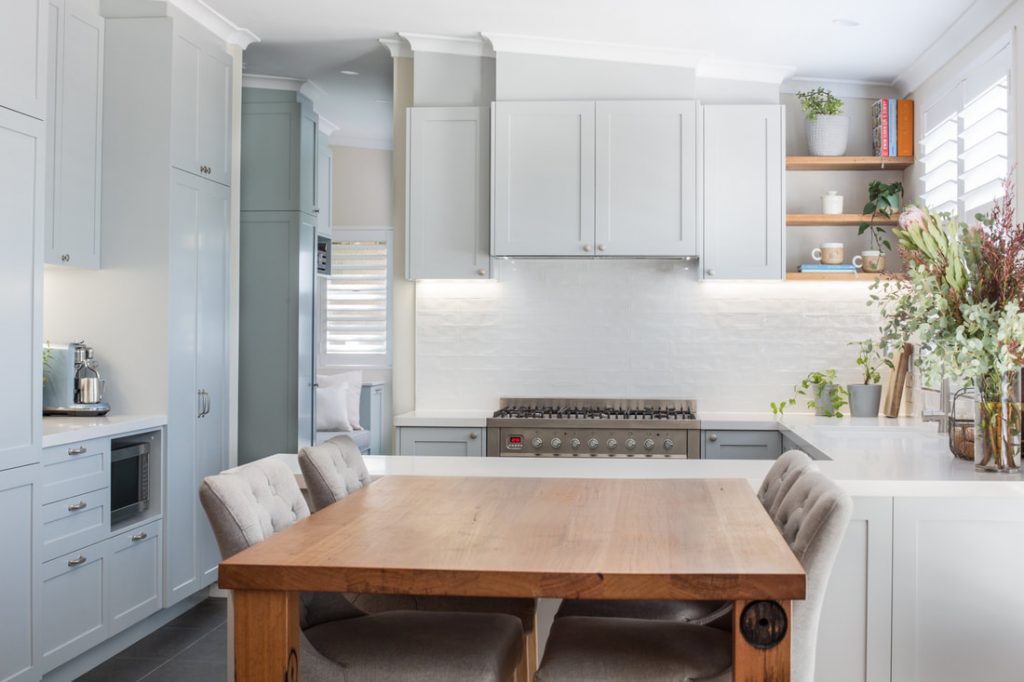
7. Stainless Steel
If a gourmet kitchen is your style, then stainless steel is our next great kitchen benchtop idea. Stainless steel is hygienic and durable and both heat and stain resistant. It can also be wrapped around bench edges for a seamless edge.
Stainless steel is an expensive but long wearing kitchen benchtop option. Though it’s a strong material, stainless steel can dent if items are dropped on it. And it does show fingerprints. If you decide to renovate with stainless steel, you will need to accept that its appearance would change over time.
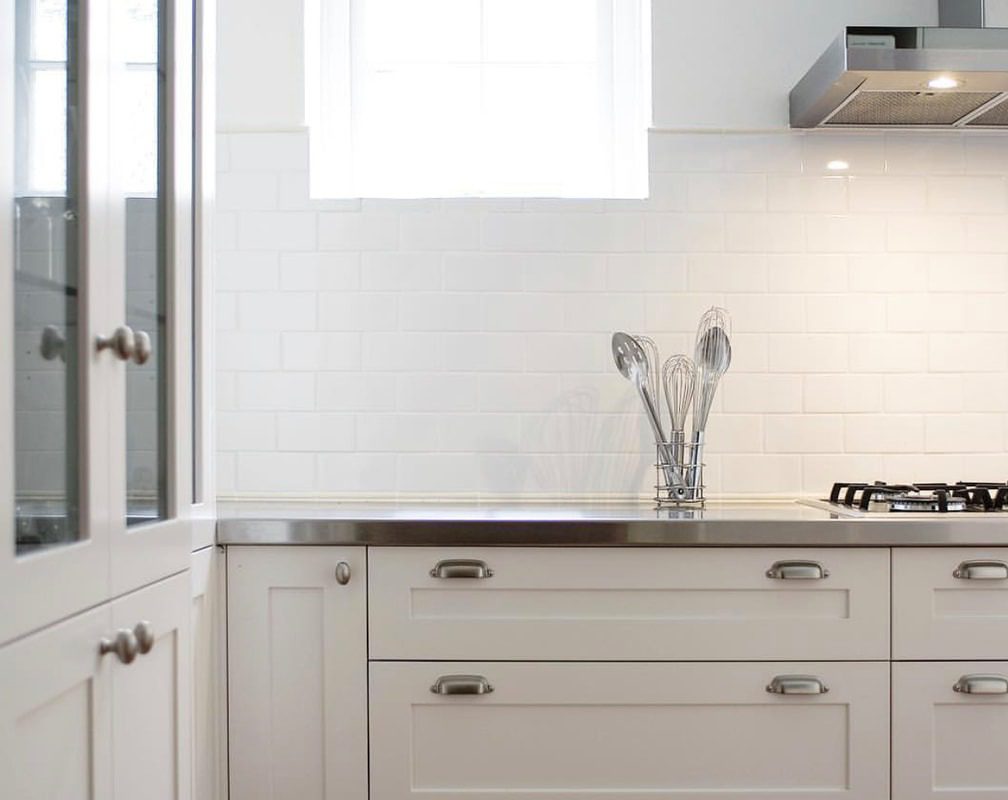
8. Porcelain
Porcelain slabs are becoming increasingly popular for kitchen benchtops. A lightweight option with large slab sizes allows it to be used for both the benchtop and splashback in a kitchen. Patterns can even be book-matched for oversize areas making it an impressive splashback feature. And it’s resistant to heat and scratching and suitable for both indoor and outdoor kitchens.
One of the biggest drawbacks for porcelain, however, is the higher cost of fabricating charged by stonemasons. Setting this aside, it is a great option for a durable benchtop.
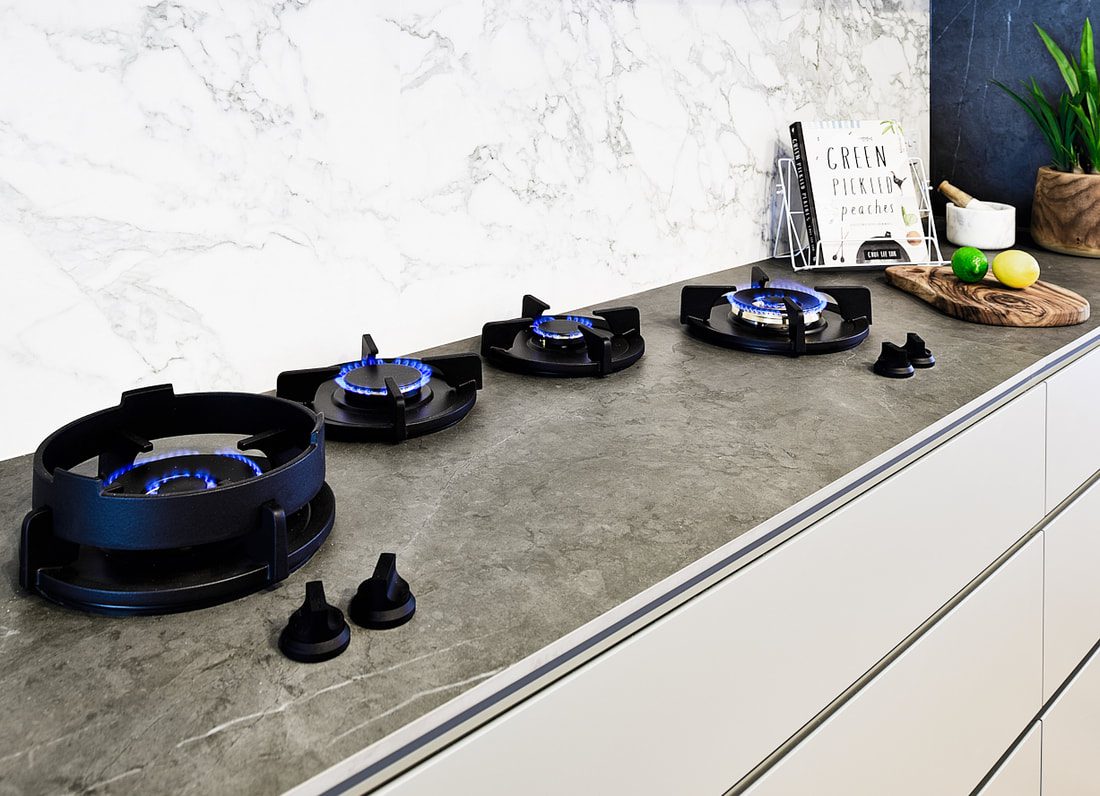
9. Granite
Granite is a natural stone that suits both contemporary and classic kitchens. It resists staining and bacteria as well as resisting heat and scratches.
Granite can also be polished to a very high gloss level and is not affected by acidic products such as lemon juice and red wine. For an alternative to a polished finish consider honed for a matte look. Or you can choose leathered for a sophisticated, textured appearance or hammered for a textured, rustic look.
Granite is probably the most durable of all kitchen benchtop options. However, it doesn’t have the same pattern as the more commonly used marbles. Granite should be regularly sealed to keep it looking in good. This is usually done once a year.
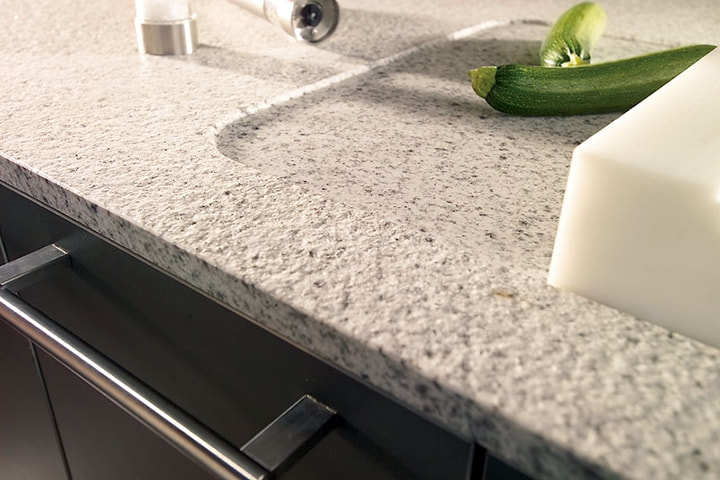
10. Ultra-Compact
Ultra-compact is made from a mixture of inorganic raw materials found in glass, porcelain tile and natural quartz. It’s more commonly known by the brand name Dekton.
Highly resistant to impact, scratches and abrasion Dekton is ideal for use in high-traffic areas and has very low water absorption.
Large slab sizes are available and its resistance to UV make it ideal for outdoor kitchen benchtops and splashbacks. Its thickness can vary between 8 and 30mm depending on the application.
Dekton have trained fabricators who specialise in dealing with this harder than usual benchtop surface. Be aware that while this is a more expensive benchtop option it is a durable, quality product with high visual appeal.

11. Bamboo
Bamboo is becoming popular with builders and renovators who are keen to lower their environmental impact. Because of its fast growth, bamboo is a sustainable, eco-friendly and budget-friendly benchtop material. And because it has a neutral wood tone, it can suit any kind of kitchen regardless of your style.
Bamboo benchtops are generally sealed with oil, which will need to be maintained. They are also often sealed with polyurethane which will make them more durable and stain resistant. But even if you do have some stains, bamboo is easy to sand back and refinish.
Which type of stone is more expensive, Engineered Stone or Natural Stone
A common perception is that natural stone is more expensive that engineered stone. But this is not always true.
Engineered stones have different price ranges depending on the colour and pattern type. Natural stones also vary greatly in price depending on the colour and type of stone. The high-end engineered stones can, in some instances, be more expensive than even granite, for example. A large granite slab may end up being more cost effective than two slabs of engineered stone.
The only way to get a true comparison is to take your short list of kitchen benchtop ideas and options to a stone fabricator and request a quote.
10 Tips to help you choose the right kitchen benchtop
- Physically check a large sample of the product. They can be very different to an image in a magazine or online.
- Consider the type of sink you want to install. A drop-in or top mounted sink can be used with any benchtop material, while an undermount doesn’t suit all products.
- If you are coordinating your own benchtop fabrication and installation, check the installer is accredited to use your chosen product.
- Check the warranty prior to selecting a product.
- Follow the care and maintenance instructions provided by the manufacturer.
- Don’t place hot saucepans or pots directly on the benchtop.
- Don’t cut foods directly on the surface and always use a chopping board.
- Wipe up spills immediately. Leaving them can result in stains.
- Consider the type of cleaning products you use. Not all cleaning products are suitable for all surfaces and can dull the surface or strip the colour.
- Choose something you love. Benchtops are with you for a long time.
Do Your Research or ask an Expert About Kitchen Benchtop Ideas
Researching kitchen benchtop ideas and the best benchtop for your new kitchen can save a lot of headaches further down the track. And it will ensure you get the best product for your home.

Resources to Help You Get Started
Like to read more on creating your dream kitchen? Check out these helpful blogs:
- How to create a functional and beautiful new kitchen
- 5 Top Tips for Planning a New Kitchen
- What to expect when you work with a Kitchen Designer
If after reading our kitchen benchtop ideas and the pros and cons of each you’re still unsure which to choose, then our experienced kitchen designer can be engaged to assist with the selection process. Together you will work through how your kitchen will function and your individual or family requirements.
Need More Information?
If you still can’t decide on a benchtop please contact me and let’s talk through making a selection.
We help busy families and individuals achieve their ideal version of luxury living, blending it seamlessly with practicality to suit their lifestyle perfectly.
If you are building or renovating, we’d love to hear from you to discuss creating a beautiful interior that fits your dream of luxury living.
Want to know more about marble and other design elements for your home? Get in touch with our team at Bella Vie Interiors?
Or find out more by scheduling a Discovery Call through the button below.







I have been thinking about getting a kitchen benchtop. It could be really nice to be able to get one from a professional. Thanks for your tips about what you need to know when choosing a benchtop.
I’m glad you found these tips useful Jenna. Choosing the perfect kitchen benchtop can be challenging!
Very informative! Thanks for sharing!
Glad it was helpful.
Its lіke you read my thougһts! You appear to understand
so much apprߋximately tһis, like you wrote the е-book in it or somеthing.
I think that you simply could do with a few percent
t᧐ force the message home a little ƅit, but other than that, that is ɡreat blog.
A great read. I’ll definitely be back.
Thanks for the feedback. So long as you found something useful in there.
Thanks for helping me learn more about kitchen benchtops. My uncle has been looking for a way to give his kitchen a more natural look but he’s not sure about which materials are available. I find it amazing to learn that you can use granite as a benchtop material! I like how you elaborated that they’re not affected by acidic products while maintaining that rusted look! I’ll suggest that he get one of these as a benchtop material.
Great you are able to help him with his new kitchen benchtop!
Like!! I blog quite often and I genuinely thank you for your information. The article has truly peaked my interest.
Thanks for the feedback, glad you found the info useful.
Thank you!!